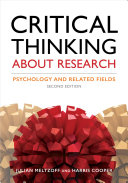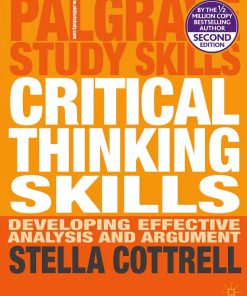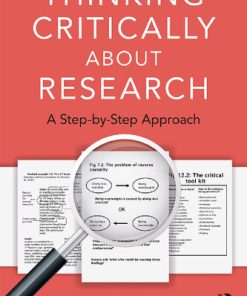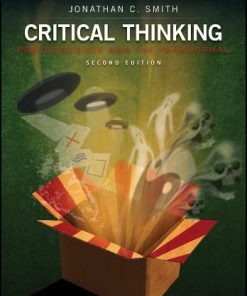Critical thinking about research psychology and related fields 2nd Edition by Julian Meltzoff, Harris Cooper ISBN 9781433827976 1433827972
$50.00 Original price was: $50.00.$25.00Current price is: $25.00.
Critical thinking about research psychology and related fields 2nd Edition by Julian Meltzoff, Harris Cooper – Ebook PDF Instant Download/Delivery: 9781433827976 ,1433827972
Full download Critical thinking about research psychology and related fields 2nd Edition after payment

Product details:
ISBN 10: 1433827972
ISBN 13: 9781433827976
Author: Julian Meltzoff, Harris Cooper
This second edition of a classic text gives students what they need to apply critical reasoning when reading behavioral science research. It begins with a thorough overview of the research process, focusing on how to assess whether the conclusions drawn in a behavioral science report are warranted by the methods used in the research. The book then provides fictional research articles with built-in flaws so readers can practice their critical thinking skills.
Critical thinking about research psychology and related fields 2nd Edition Table of contents:
I
Principles of Critical Thinking
1. Seeking Trustworthy Knowledge
Methods of Seeking Knowledge
What Critical Reading Requires
2. Research Questions and Hypotheses
Types of Research Questions
Hypotheses
What is Causation?
Necessary and Sufficient Causes
A Working Definition of Causation
Causality and Experiments
Unsubstantiated Claims of Causation
Multiple Correlation and Causation
Consistency Between the Parts of a Scientific Investigation
Summary
3. Research Variables and Strategies
Variable Definitions in Research
Conceptual and Operational Definitions
Experimental and Measured Variables
Establishing Levels of the Independent or Predictor Variable
Time Sequencing of Measurements
Longitudinal Versus Cross-Sectional Studies
Real-Life Versus Analogue-Simulated Situations
Settings
Generalizability in the Context of Variables, Timing, Realism, and Settings
Summary
4. The Sample
Sample Characteristics
Target and Accessible Populations
Representativeness of the Sample
Different Methods for Drawing Samples
Sample Bias
Sample Size
Assignment to Treatment Groups
Summary
5. Confounding Variables and Their Control
Participant Variables
Experimenter Variables
Stimulus, Procedural, and Situational Variables
Instrumentation (Apparatus and Raters)
Placebo Effects
Nuisance Variables
Summary
6. Research Designs and Threats to Internal Validity
Classification of Threats to Internal Validity
Preexperimental Designs
Quasi-Experimental Designs
True Experimental Designs
Single-Case Designs
Summary
7. Manipulation and Measurement Validity
The Independent or Predictor Variable
The Dependent Variable
Reliability
Validity
Influence of Measurement on the Dependent Variable
Types of Measurement Data
Measurement Scales
Raters and Judges
Summary
8. Data Analysis, Discussion, and Conclusions
Levels of Measurement and Their Appropriate Analysis
Distributed Versus Categorical Variables
Assumptions
Degrees of Freedom
Statistic Selection and Presentation
Computation
Multiple Dependent Variables and Type I Error
Planned Comparisons and Post Hoc Tests
Testing for Group Equivalence at Pretest
Change Scores
Effect Sizes
Power
Graphs
Summary
9. Inferences, Conclusions, and the Research Report
Drawing Inferences From the Data
Statistical Significance, Generality, and Practical or Clinical Significance
Interpreting Effect Sizes
The Research Report
Summary
10. Research Syntheses and Meta-Analysis
The Stages of Research Synthesis
The Elements of Meta-Analysis
Summary
11. Research Ethics
Protection of Human Participants
Conducting and Reporting Research
Other Ways to Manipulate Results
Plagiarism
Duplicate Publication
Summary
II
Critical Thinking Using Practice Articles
Practice Article 1. Use of Counselor “Street Talk” to Stimulate Self-Disclosure of Inner-City Youths
Practice Article 2. Treatment of Flying Phobia: Comparative Efficacy of Two Behavioral Methods
Practice Article 3. The Effect of Divorce on Sons’ Aggression
Practice Article 4. Dyslexia in Fifth-Grade Girls: Personality and Perceptual Factors
Practice Article 5. Time Estimation: Effect of Depression and Pleasantness or Unpleasantness of an Experience
Practice Article 6. Bossiness in Firstborn Girls
Practice Article 7. Effect of Context Upon Accuracy of Recall of Affective Experiences
Practice Article 8. The Effects of Medication and Cognitive Behavior Therapy on Insomnia
Practice Article 9. Midlife Crises of Men at Age 50
Practice Article 10. Effect of Job Stress and Stress Management on Low Back Pain
Practice Article 11. Evaluation of Health Maintenance Organizations
Practice Article 12. Effects of Jury Selection Consultation on Trial Outcome
Practice Article 13. Contingency Reinforcement in the Treatment of Talking Aloud to Self: A Single-Case Study
Practice Article 14. The Effect of Race of Examiner on IQ Scores of American Indians
Practice Article 15. Social Effects of Tax Deadline
Practice Article 16. Comparative Effectiveness of Teacher Management Styles in a Fifth-Grade Classroom
Practice Article 17. Age Differences in Gullibility: A Meta-Analysis
EPILOGUE
GLOSSARY
People also search for Critical thinking about research psychology and related fields 2nd Edition:
critical thinking about research psychology and related fields second edition
what is critical thinking in research
why is critical thinking important in psychology
critical thinking about research meltzoff pdf
critical thinking psychology essay
Tags:
Julian Meltzoff,Harris Cooper,Critical thinking,research psychology,related fields
You may also like…
Politics & Philosophy - General & Miscellaneous Philosophy
Education Studies & Teaching - Studying & Test Preparation
Politics & Philosophy - General & Miscellaneous Philosophy
History & Research
Politics & Philosophy - Anthropology
Reference - Other Reference By Subject
Thinking Critically about Research A Step by Step Approach 1st Edition Jane Ogden
Education Studies & Teaching - Philosophy of Education
Politics & Philosophy - Renaissance & Modern Philosophy
Smart thinking for critical understanding and writing 2nd Edition Matthew Allen











